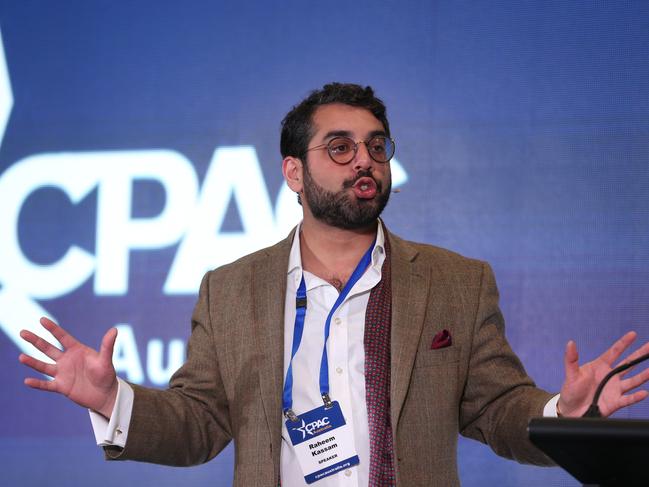Culture of contempt corrodes us
Labor’s shamer-in-chief is emasculating her credibility with her notice-me antics.

The weekend conference is not a takeover of any kind, just a conversation between people across the centre-right spectrum, from libertarians to conservatives.
Keneally helped me out personally too, again inadvertently. She provided me with a timely and damning piece of evidence to prove the case I put to the audience — that we live in a culture of contempt.
There is nothing more contemptuous of our democracy, of other ideas, and other people, than trying to shut people up or trying to shame them into silence. On that measure, more ears may have turned a bright shade of red.
But let’s start with Keneally. She demanded that the Morrison government ban the former editor of Breitbart News London, Raheem Kassam, from entering Australia to attend CPAC because his views about Islam (Kassam is an ex-Muslim), his tweet about Scottish leader Nicola Sturgeon and no doubt other comments, too, offend her sensibilities.
Her point was that the government banned Milo Yiannopoulos from entering Australia last year because he is controversial, and some find him offensive. Ergo, the Morrison government must also ban Kassam.
That would be consistent. But worshipping consistency takes you only so far.
The ABC’s Q&A program is consistent — consistently boring. Jeremy Corbyn is consistent — consistently anti-Semitic. John Setka is consistent — consistently … no, I won’t go there.
Democratic principles matter more. The Morrison government was wrong to ban Yiannopoulos and the government is right not to ban Kassam. A competition of ideas, even robust disagreements and debates, underpins progress and innovation, allowing us to settle on the best ideas, the best solutions and the best policies.

Keneally also tried to shame Liberal senator Amanda Stoker into not attending CPAC. Again, it lacks basic logic to claim that, by being at CPAC, Stoker agrees with everyone there or that she condones everything that is said.
As Stoker said in response: “Trying to shame into silence anyone who would speak to a person who is wrong on an issue damages our capacity for a constructive democracy. If we are doing our job properly as politicians, we should be talking with people from all walks of life, every day. We won’t agree with them all.”
She is right.
Even in that room yesterday morning, there was disagreement. For example, my view is that Kassam’s three-year-old tweet — “Can someone just like … tape Nicola Sturgeon’s mouth shut? And her legs, so she can’t reproduce” — was not a “silly joke”, as he claimed after he deleted it. Instead, it is evidence of our increasingly polarised world.
On the other side of the divide, Keneally accused the Prime Minister of staying silent while CPAC was “importing people” into our country who believe in gun rights.
Keneally should think more, and posture less. She is emasculating her credibility with her notice-me antics. Not to mention suggestions that our democracy is not strong enough to withstand the voices of a few Yanks who support their constitutional right to bear arms. Rest assured, senator, a vibrant contest of ideas in this country will challenge the views of those visitors.
If believing in gun rights is a reason to stop foreigners “hobnobbing with Liberal MPs”, as she claimed this week, then she should stop talking to US Democrats because members of both major US parties support gun rights in their country. Instead of banning people, we should be intellectually curious, exploring why people on both sides of politics, Keneally included, have become so polarised.
That’s what Arthur Brooks does in his recent book Love Your Enemies: How Decent People Can Save America from the Culture of Contempt, published this year.
Like me, the former president of the American Enterprise Institute assumed that anger is fuelling our political polarisation. In the US, one in six Americans have stopped talking to a family member or a close friend since the 2016 presidential election of Donald Trump. And parents now worry far more about their children marrying someone with different political views.
Brooks writes about a phenomenon called motive attribution asymmetry — the assumption that my beliefs are based on love, while my opponent’s beliefs are built on hate. Brooks cites research that has found, on average, Republicans and Democrats suffer from a level of motive attribution asymmetry comparable with Palestinians and Israelis who were surveyed over their regional conflict — “each side thinks it is driven by benevolence, while the other is evil and motivated by hatred — and is therefore the enemy with whom one cannot negotiate or compromise”.
Then Brooks spoke with psychological researcher and relationship expert John Gottman, a Washington University professor and co-founder of the Gottman Institute. Gottman’s work with dysfunctional couples found that when relationships break down, anger is not the worst problem. Anger is a hot emotion; it means people still care.
Gottman found that a serious divide opens up when anger is mixed with disgust. That mix of anger and disgust turns a hot emotion into contempt.
And contempt is cold, it reeks of scorn, it says you don’t care about the other person, they are worthless. Contempt makes no room for compromise. It delivers a quick shot of superiority that feels good. And when we do something that feels good, our brain remembers it, creating a dopamine path, recording the pleasure. So we do it again and again, building a highway of recorded pleasure. This is how addictions take hold, delivering short bursts of feeling good, even if we know that what we are doing is bad for us.
Dealing with couples, Gottman found that one person will often react to a partner’s contempt with contempt, but they can still love each other. The problem is they have acquired a bad habit. Contempt makes reconciliation much harder. Not impossible, but harder, because of that cycle.
It’s the same in American politics, Brooks says. And sadly, it is the same in Australia.
Keneally is evidence of that culture of contempt, a habit of, even an addiction to, showing contempt for others, believing that people with different views are so lacking in moral worth, they should not be heard. Sadly, she is far from alone.
From attempts by academics to censor historian Geoffrey Blainey in the 1980s, to bogus claims brought against Bill Leak for drawing a cartoon about family dysfunction in some indigenous communities, institutionalised contempt for free speech is evident across the modern left.
That culture of contempt set in when many moved away from classical liberal values to newly created so-called human rights premised on victimhood.
Contempt explains why Richard Di Natale imagines that he is so superior in his views that sections of Sky News — Andrew Bolt, Chris Kenny, etc — should be shut down on the grounds of hate speech, meaning speech the Greens leader hates.
Contempt for free speech has spread to people who should know better about a contest of ideas in an enlightened democracy. When Noel Pearson resorted to abusive language last weekend, accusing the Institute of Public Affairs of using “child soldiers” to delegitimise indigenous people’s role in national debates, that bullying is contempt for other views, and for other people, in his case young white conservative men.
Brooks’s equation (anger + disgust = contempt) has led some to appoint themselves as national arbiters of morality. When Rugby Australia decided to terminate Israel Folau’s contract after he posted his religious beliefs on his personal social media platforms, this too was part of our deepening culture of contempt. RA didn’t just disagree with the rugby champion, it ended his playing career.
Contempt manifests itself in different ways. At a political conference last month, African-American Democrat congresswoman Ayanna Pressley, a member of The Squad, said: “We don’t need any more brown faces that don’t want to be a brown voice. We don’t need black faces that don’t want to be a black voice. We don’t need Muslims that don’t want to be a Muslim voice.”

The young Democrat sounds like a character in a cartoon strip for identity politics. But this is real. She is telling people: your voice counts for nought unless you speak for a tribe. This contempt for people as individuals is undermining the democratic project.
Most of us are guilty of showing contempt to others in some form or another, from trivial to damaging. But to answer University of Sydney vice-chancellor Michael Spence, who said a few months ago that both sides are equally uncivil, I test it this way: in 20 years of writing, I haven’t asked for anyone to be silenced or censored or de-platformed or banned from entering Australia, unless they have directly incited others to violence. Short of that thick black line, say what you want. And here’s what I have to say in response. Words are not a form of violence unless they tell people to commit violence.
How many on the other side of politics can say that they have not demanded people they disagree with be censored? How many have stayed silent when their ideological comrades demanded censorship of views they deemed offensive, or hate speech, or racist, or homophobic because they disagreed with them?
One way to beat this culture of contempt is to obliterate our silos, says Brooks, by listening to different viewpoints. And to resist the contagion. Because contempt is contagious. People can get caught in an escalating cycle of treating others with contempt. And remember that you will never win an argument with someone by making people feel inferior, stupid or worthless. And just as contempt is contagious, so is compassion, he says. If you are around a compassionate person, a respectful person, you are more likely to show compassion, and respect. And if you, in turn, project these same qualities on to people, maybe they will become more compassionate, more respectful.
Try smiling, rather than frowning, Brooks writes, pointing to research that finds smiling lowers our biases about others. Even if you don’t feel like smiling, just do it, he says, citing research about “self-perception theory”, which says that acting “as if” you feel something will actually result in that feeling. Try it, it works.
The aim is not to disagree less. The aim is to disagree better, because our democracy will wither unless both sides of politics beat this culture of contempt.
Janet Albrechtsen is chairman of the Institute of Public Affairs. This formed part of her speech at CPAC yesterday.




Kristina Keneally’s ears may have been burning yesterday morning. Speaking at the first Conservative Political Action Conference in Australia, I had a few words to say about the Labor senator. One was a sincere thank you. Single-handed, her feverish claims about an alt-right takeover of Australia because of a few overseas speakers at CPAC helped make this a sellout event. Senator, expect a bunch of flowers.